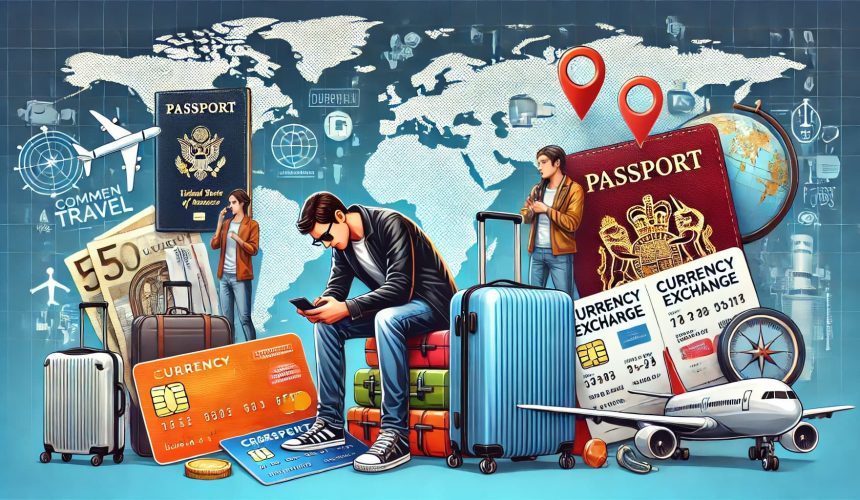Traveling is an exciting adventure, but even the most seasoned travelers can make mistakes that lead to unnecessary stress or unexpected costs. To help you have a smooth and enjoyable trip, here are some common travel mistakes and tips on how to avoid them.
1. Overpacking
The Mistake: Many travelers pack too much, filling their suitcases with items they think they might need but end up not using. Overpacking can lead to heavy luggage, extra baggage fees, and difficulty moving around.
How to Avoid It:
- Pack Smart: Create a packing list of essential items based on your destination and activities. Stick to the basics and choose versatile clothing that can be mixed and matched.
- Use a Carry-On: If possible, limit yourself to a carry-on bag. This not only saves money on baggage fees but also forces you to pack only what’s necessary.
- Check the Weather: Research the weather forecast for your destination and pack accordingly. There’s no need to bring heavy jackets if you’re heading to a tropical beach.
2. Ignoring Local Customs and Etiquette
The Mistake: Failing to respect local customs and etiquette can lead to awkward situations or even offend the locals. This can happen when travelers assume that the same social norms apply everywhere.
How to Avoid It:
- Research Before You Go: Spend some time learning about the culture, customs, and etiquette of your destination. Understand the basics of local greetings, tipping practices, and appropriate dress codes.
- Be Observant: Pay attention to how locals behave and follow their lead. When in doubt, it’s always better to be more conservative and respectful.
- Learn Basic Phrases: Knowing a few key phrases in the local language can go a long way in showing respect and making a positive impression.
3. Not Checking Passport and Visa Requirements
The Mistake: Some travelers forget to check their passport’s expiration date or overlook visa requirements for their destination. This can result in being denied entry to a country or facing long delays.
How to Avoid It:
- Check in Advance: Well before your trip, check your passport’s expiration date. Many countries require your passport to be valid for at least six months beyond your travel dates.
- Research Visa Requirements: Look up the visa requirements for your destination. Some countries allow visa-free entry, while others require a visa application in advance.
- Make Copies: Carry a copy of your passport and visa (if required) and keep it separate from the originals. It’s also a good idea to have digital copies stored securely online.
4. Not Having Travel Insurance
The Mistake: Skipping travel insurance to save money is a common mistake that can end up costing you much more in the long run if something goes wrong.
How to Avoid It:
- Purchase Travel Insurance: Invest in travel insurance that covers medical emergencies, trip cancellations, lost luggage, and other unforeseen events. It’s a small price to pay for peace of mind.
- Understand Your Coverage: Read the policy carefully to understand what’s covered and what’s not. Make sure it includes coverage for activities you plan to do, such as adventure sports.
- Keep Emergency Contacts: Carry the contact information for your travel insurance provider and know how to make a claim if needed.
5. Overscheduling Your Itinerary
The Mistake: Packing too many activities into each day can lead to burnout and prevent you from truly enjoying your destination. Overscheduling also leaves little room for spontaneous experiences.
How to Avoid It:
- Prioritize Key Activities: Choose the top attractions or activities you want to experience and schedule them. Leave some free time in your itinerary for relaxation or unplanned adventures.
- Be Realistic: Consider travel time, potential delays, and the energy required for each activity. It’s better to fully enjoy a few experiences than to rush through many.
- Embrace Spontaneity: Allow yourself the flexibility to explore, wander, and discover unexpected gems. Some of the best travel memories come from unplanned moments.
6. Not Keeping Track of Exchange Rates and Fees
The Mistake: Failing to monitor exchange rates and fees can lead to overspending or getting less value for your money. Some travelers also forget to notify their bank of international travel, resulting in blocked cards.
How to Avoid It:
- Monitor Exchange Rates: Use apps or websites to track exchange rates before and during your trip. Exchange money at reputable locations, avoiding airport kiosks with unfavorable rates.
- Use Credit Cards Wisely: Choose a credit card with no foreign transaction fees. Notify your bank of your travel plans to prevent your card from being blocked for suspicious activity.
- Carry Local Currency: Have some local currency on hand for small purchases, tips, or places that don’t accept cards. Withdraw cash from local ATMs to get the best rates.
7. Underestimating Travel Time and Jet Lag
The Mistake: Not allowing enough time for travel between destinations or underestimating the effects of jet lag can disrupt your plans and leave you exhausted.
How to Avoid It:
- Plan for Buffer Time: Build extra time into your travel schedule to account for delays, layovers, and potential jet lag. This will help you adjust and enjoy your trip without feeling rushed.
- Adjust Your Sleep Schedule: Before your trip, gradually adjust your sleep schedule to match your destination’s time zone. Once you arrive, try to stay awake until a reasonable bedtime to acclimate more quickly.
- Stay Hydrated and Rested: Drink plenty of water during your flight and avoid alcohol or caffeine. Get as much rest as possible to minimize the effects of jet lag.
8. Relying Solely on Technology
The Mistake: While technology can be a traveler’s best friend, relying solely on your smartphone or other gadgets can lead to problems if your battery dies, you lose signal, or apps fail to work.
How to Avoid It:
- Have Backup Plans: Carry physical copies of important documents, maps, and reservations in case your devices fail. A printed guidebook or map can be a lifesaver.
- Charge and Backup Devices: Keep your devices charged, and carry a portable power bank. Regularly back up photos and important data to the cloud or an external drive.
- Learn Basic Navigation: Familiarize yourself with key landmarks and routes in your destination. This way, you won’t be entirely dependent on GPS or online maps.
Conclusion
Traveling is a learning experience, and even the best-laid plans can sometimes go awry. By being aware of these common travel mistakes and taking steps to avoid them, you can minimize stress and maximize your enjoyment. Remember, the key to successful travel is preparation, flexibility, and a positive attitude. Safe travels!




